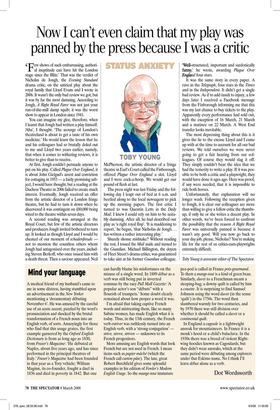Mind your language
A medical friend of my husband’s came to me in some distress, having stumbled upon an advertisement in the New Yorker mentioning a ‘documentary débuting November 6’. He was amused by the careful use of an acute accent, puzzled by the word’s pronunciation and shocked by the brutal transformation of a French noun into an English verb, of sorts. Annoyingly for those who find that this usage grates, the first example garnered by the Oxford English Dictionary is from as long ago as 1830, from Fraser’s Magazine: ‘He debuted at Naples, about five years ago, and has since performed in the principal theatres of Italy.’ Fraser’s Magazine had been founded in that year as a Tory vehicle; William Maginn, its co-founder, fought a duel in 1836 and died in poverty in 1842. But one can hardly blame his misfortunes on the misuse of a single word. In 1889 début as a verb was still being put in inverted commas by the racy Pall Mall Gazette: ‘A popular actor’s son “débuts” with a flourish of trumpets.’ Some doubt clearly remained about how proper a word it was.
I’m afraid that taking captive French words and mistreating them, like so many Sabine women, has made English what it is today. Thus, in the 13th century, the French verb estriver was ruthlessly turned into an English verb, with a ‘strong conjugation’ — strive, strove, striven — unknown to its French progenitors.
More amusing are English words that look French but are not used in French. I mean items such as papier mâché (which the French call carton-pâte). The late, great Robert Burchfield gives some splendid examples in his edition of Fowler’s Modern English Usage. So the mange-tout immature pea-pod is called in France pois-gourmand. To them a mange-tout is a kind of green bean. Similarly, duvet to a Frenchman meant a sleeping-bag; a downy quilt is called by him a couette. It is surprising to find Samuel Johnson using the word duvet (in the sense ‘quilt’) in the 1750s. The word then slumbered warmly for two centuries, and by 1970 there was still division over whether it should be called a duvet or a continental quilt.
In England a cagoule is a lightweight anorak for mountaineers. In France it is a monk’s hood or a child’s balaclava. In the 1930s there was a breed of violent Rightwing hoodies known as Cagoulards, but they didn’t wear anoraks, which at the same period were débuting among explorers under that Eskimo name. No I think I’ll leave début alone as a verb.
Dot Wordsworth


















































































 Previous page
Previous page